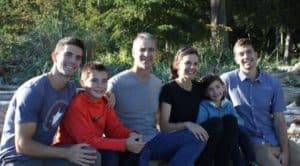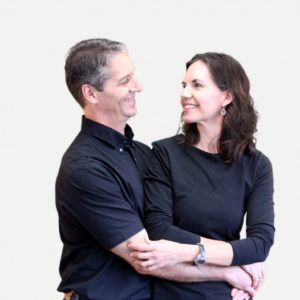Sean and Lezlie Allison know that everything works in God’s timing.
Both had wanted to serve in missions from an early age and threw themselves into the pursuit wholeheartedly through short-term trips and linguistics studies. When Sean and Lezlie met in graduate school, everything seemed to fall into place. After a whirlwind courtship and marriage, they found themselves heading to West Africa with two babies in tow.

When asked where they wanted to serve, Sean and Lezlie told their director they were open to working anywhere as long as it wasn’t in an environment with extreme heat combined with little water. So the couple visited three different people groups: one who lived in the mountains, one who lived on the coast and one located in a dry, arid region.
Out of the three groups, the desert people group was the only one without churches or Bible translation projects.
On the first night of their visit to the desert region, Lezlie started crying. When Sean asked what was wrong, she shared her reservations about living in such a harsh, isolated environment. Then she said, “But I believe God is calling us here.”
“We needed to be open to God’s leading,” Sean reflected. “We realized that if no one went to the [desert location], translation would never be done, because of the majority religion of the area.”
“It was like God was saying, ‘This is what I’d like you to do. Even if it’s hard, even if it’s lonely, just trust me,’” Sean said.
Changed Plans
For nine years, Sean and Lezlie lived among this people group, learning the language and culture. Eventually they started translation, working with a co-translator who followed the majority religion but was willing to be involved in translation work.
In 2006, Sean was asked to get a PhD in linguistics to help further translation work in other projects as well. As he came to the end of the doctorate in 2011, civil unrest broke out in the language area where they had been working, preventing them from returning to the area. They haven’t been able to go back to the language area since.

But that hasn’t stopped the Canadian couple from supporting Bible translation work. Sean and Lezlie currently serve on the faculty of Wycliffe Canada’s training partner, the Canada Institute of Linguistics. Additionally, Sean travels to West Africa every year to work with his co‑translator. They meet in a neighbouring country and have slowly been making progress on the translation work. They have finished drafting and recording the Gospel of Mark and are now halfway through Genesis.
“I play the recorded translations for a speaker of the language who has become a Christian,” says Sean, “so he can give input on them. He would like to reach out to his own people, but he can’t go back either.
“When he became a Christian, [the majority religion leaders] took away his wife and kids. It’s been a struggle for him too. But he trusts that at some point, he can go back and serve in his own area.”
“His reaction [to the translation] is always amazing, because he’s hearing God’s Word in his own language. He says, ‘The first time I hear it [in my own language], I understand it right away, rather than when I hear it in [a majority language of the area]!’”
Creative Methods
Sean and Lezlie are working hard to develop creative, innovative methods to reach people in West Africa with the translated Scriptures.They are experimenting with oral translation methods, via computers and online resources which allow Christians with less formal education to get involved. For example, they are developing online audio recordings where the voices of the speakers are modified so they won’t be persecuted by members of the majority religion.
Additionally they’re working on projects like an online transition primer so language community members can transition from reading French to reading their own language.
“It’s interactive,” says Sean. “They can input an answer [and] get feedback, and it helps me see if there are any issues that need to be addressed with the proposed system of writing.”
Sean and Lezlie hope the primer provides them with the ability to connect with local speakers of the language who may be willing to work on translations or test the translation work in the future. Sean and Lezlie are also experimenting with Scripture apps that link audio recordings with written translations to facilitate more checking and exposure.
“It’s not the traditional approach,” says Sean. “But we are always looking for ways to move forward. In language projects like ours, it is a challenge and we just need to rely on the Lord and believe that He desires to bring these people to himself more than we do. So we leave it in His hands.”
“We felt the Lord’s leading very strongly [when we went] to [West Africa],” adds Lezlie. “And while we were there, we saw His tender care for us. Now when it feels like things aren’t moving along according to our timing, we have great confidence that God has something good for this people group.
“One day when a church is formed among them, they will have God’s Word to help them grow and be discipled. It’s a work of faith.”
Source: wycliffe.org
Visit the Allisons’ profile page

